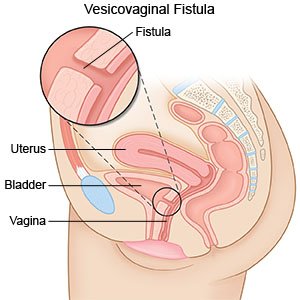Vesicovaginal Fistula Repair
Medically reviewed by Drugs.com. Last updated on Apr 6, 2025.
What do I need to know about a vesicovaginal fistula repair?
Vesicovaginal fistula repair is surgery to close or remove a fistula between your bladder and vagina. A fistula is an abnormal tissue connection or hole. When you have a fistula, urine exits your body through your vagina, and you cannot control the flow of urine.
 |
How do I prepare for surgery?
Your healthcare provider will talk to you about how to prepare for surgery. He or she may tell you not to eat or drink anything after midnight on the day of your surgery. Your provider may tell you to shower the night before your surgery. He or she may tell you to use a certain soap to help prevent a surgical site infection. Your healthcare provider will tell you what medicines to take or not take on the day of your surgery. Arrange to have someone drive you home and stay with you after surgery.
Drugs used to treat this and similar conditions
Keflex
Keflex (cephalexin) is used to treat infections caused by bacteria, including respiratory ...
Cipro
Cipro (ciprofloxacin) is a fluoroquinolone antibiotic used to treat bacterial infections. Learn ...
Ozempic
Learn about Ozempic (semaglutide) for type 2 diabetes treatment, weight management, cardiovascular ...
Botox
Botox is used to treat chronic migraines, excessive sweating, bladder conditions, eye muscle ...
Pyridium
Pyridium (phenazopyridine) treats pain, burning, increased urination, and increased urge to ...
Darifenacin
Darifenacin systemic is used for overactive bladder, urinary frequency, urinary incontinence
Sulfamethoxazole/trimethoprim
Sulfamethoxazole/trimethoprim systemic is used for acne, bacterial infection, bacterial skin ...
Hydroxyzine
Hydroxyzine is an antihistamine used to treat itching, hives, and anxiety. It also acts as a ...
Solifenacin
Solifenacin systemic is used for neurogenic bladder, neurogenic detrusor overactivity, overactive ...
What will happen during surgery?
- You will be given general anesthesia to keep you asleep and free from pain during surgery. You may be given an antibiotic to help prevent an infection. Your surgeon may insert a scope through your urethra to check the location of your fistula. A stent will be placed in each ureter to protect them during surgery. Your surgeon will make an incision around the fistula. The fistula will be cut out or sewn closed. The outside walls of your vagina and bladder will be separated. Your surgeon will close the incision with stitches. Bandages soaked with antibiotic medicine may be placed in your vagina to help prevent infection.
- If your surgery is done through your abdomen, your surgeon will make an incision under your belly button. The wall of your bladder will be cut away from your vagina and the fistula removed. Your surgeon may put a suprapubic catheter through your abdomen and into your bladder before it is closed. The catheter is used to drain your urine and may stay in place for up to 3 weeks. You may also need a drain to remove extra blood and fluid. The incision will be closed with stitches.
What are the risks of surgery?
You may bleed more than expected or get an infection. Your ureters may be damaged. You may have bladder spasms and vaginal bleeding. You may develop bladder stones or not be able to empty your bladder completely. You may still leak urine or have urges to urinate often. Surgery may make your bladder smaller or shorten your vaginal canal. Even after having surgery to remove your fistula, a new fistula may form.
Care Agreement
You have the right to help plan your care. Learn about your health condition and how it may be treated. Discuss treatment options with your healthcare providers to decide what care you want to receive. You always have the right to refuse treatment. The above information is an educational aid only. It is not intended as medical advice for individual conditions or treatments. Talk to your doctor, nurse or pharmacist before following any medical regimen to see if it is safe and effective for you.© Copyright Merative 2025 Information is for End User's use only and may not be sold, redistributed or otherwise used for commercial purposes.
Further information
Always consult your healthcare provider to ensure the information displayed on this page applies to your personal circumstances.
